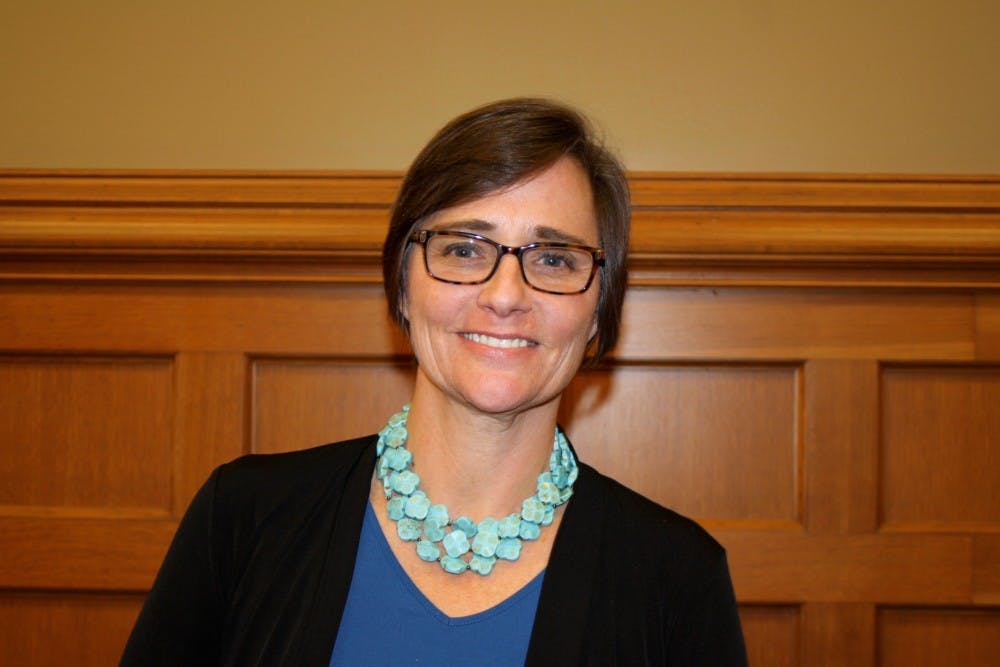Mary Kelly Tate has worked as a law professor at the University of Richmond for 13 years and continues to advocate for the wrongfully convicted in her work on and off campus.
On Oct. 27, The Washington Post published an article about Tate’s advocacy for Jens Soering, who was convicted of a double murder in 1985.
Soering, the son of a German diplomat, was convicted for the murder of his girlfriend Elizabeth Haysom’s parents in their Virginia home while Soering and Haysom were both students at the University of Virginia.
A bloody sock print containing type-O blood was originally used to tie Soering, who has type-O blood, to the crime scene.
A recent analysis has proved that Soering was not the source of at least some of the type-O blood found at the crime scene, according to the Post article.
After an in-depth review of the new evidence, Tate said she felt confident in her decision to write a letter to Virginia Gov. Terry McAuliffe asking him to grant Soering a pardon.
Tate would not comment on the specifics of the Soering case to protect her client and his chances of receiving a pardon, but she said the Post article had given her a feeling of pride in both her students and UR.
Tate is the director of UR’s First-Year Seminar (FYS) program and teaches the FYS course Wrongful Convictions in Modern America, as well as a seminar and clinic in the Law School on wrongful convictions.
Tate is also the founder of the Institute for Actual Innocence at UR.
“The Institute for Actual Innocence creates and develops programming, scholarship, speakers, things of that nature," Tate said. "And then the lawyering and the pedagogical work occurs at the wrongful convictions level in the clinical space."
Tate's students in the wrongful convictions clinic work directly with her to investigate cases, which usually involve murder or rape, in which there is an initial concern for the accuracy of the outcome, Tate said.
A plan or set of initiatives are used to review the case, which is a very complex and time-consuming process that includes interviewing the potential client, interviewing witnesses, going to courthouses, trying to find old evidence and requesting additional DNA testing.
Enjoy what you're reading?
Signup for our newsletter
If there is strong evidence of a wrongful conviction in a case reviewed by the clinic, students will litigate the case under the writs of actual innocence in the state of Virginia, or will pursue a pardon or parole at the state level, Tate said.
“We have even pursued the pardon commutation process in the federal system and recently won a commutation for our federal client when Barack Obama commuted his life sentence to time served," she said.
Emily Powell, a law student at UR who will graduate this May, said, “In my clinic we were looking at actually two potential clients to take on, reading their case files and then advising Professor Tate on whether the clinic should take them on as clients.”
Powell received her undergraduate degree from the University of Virginia in 2015 and has a focus in criminal law, which she said she had been interested in since high school. Powell said that her wrongful convictions clinic with professor Tate had been her favorite part of her second year in law school because of the energy Tate brought to the class.
“I feel like she is a huge cheerleader of mine in my job search and she is definitely the type of professor that you want to have in your corner, so I cannot speak highly enough of her," Powell said. "She is a fabulous human being."
Tate said she had first become interested in post-conviction work, which encompasses the broad topic of wrongful convictions, in graduate school.
“I was interested in the case law around habeas corpus and then when I had a clerkship at the United States District Court for the eastern district of Virginia with Judge [Robert] Merhige, I was fascinated by the habeas corpus petitions that came through," Tate said.
In law, the writ of habeas corpus allows a person to report unlawful detention or imprisonment and request the presentation of a valid reason for that person’s detention.
“I was appointed to a federal habeas corpus death penalty case by Judge Merhige and that case truly ignited and solidified the interest that first arose for me in law school,” Tate said of her work at Hunton & Williams, a large law firm in Richmond.
“She deserves a lot of recognition for everything that she does," Powell said, “It’s a lot of hard work."
Contact news writer Kiersten Ness at kiersten.ness@richmond.edu.
Support independent student media
You can make a tax-deductible donation by clicking the button below, which takes you to our secure PayPal account. The page is set up to receive contributions in whatever amount you designate. We look forward to using the money we raise to further our mission of providing honest and accurate information to students, faculty, staff, alumni and others in the general public.
Donate Now



